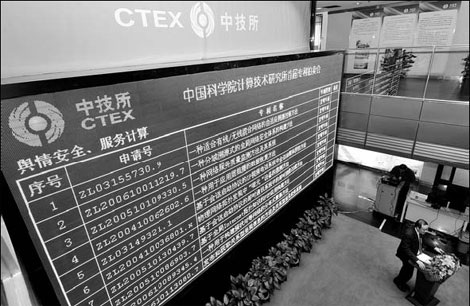|

A briefing by China Technology Exchange, one of the auction's co-organizers, provides details to potential bidders. Provided to China daily
|
Ninety high-tech patents developed by the Chinese Academy of Science's Institute of Computing Technology (ICT) will be auctioned in Beijing on Dec 16, just a part of more than 320 patents held by the technology powerhouse that will be sold.
The rest will be auctioned in the first half of next year, according to Li Zhonghua, assistant president of China Technology Exchange (CTEX), one of the auction's four organizers.
The patents up for auction include those in information technology, wireless communication, integrated circuits, data security, networking of everyday appliances and high-performance computing.
Different from an auction of goods, patents have more complex considerations, Li told China Daily in a telephone interview.
"We will offer a preliminary appraisal about the patents for bidder reference," he said.
"Based on the current market and their future strategies, potential bidders will also evaluate patents themselves or name a third party to analyze the technology and its future prospects."
The legal status of the patents is another major concern of bidders, Li said, so one of the co-organizers is Unitalen, a leading law firm specialized in intellectual property.
Organizers have already held presentations in Beijing, Shanghai and Shenzhen to describe the technological specifications, potential applications and legal status of patents up for bid.
While the audience in Shanghai showed intense interest in technologies for networking everyday items - also known as the "Internet of Things" - Shenzhen companies were keen on telecommunications patents, according to Li.
Li Xiaojun, head of the institute's intellectual property office, said the ICT's goals are to "let companies know that we have the patents and to showcase our R&D capability".
"Trade in bulk in this way is probably not as profitable as individual negotiations," she said. "But we want to get more patents industrialized at one time."
Of the 90 patents now on sale, 24 will be auctioned without a reserve minimum price. Those technologies range from the Internet and wireless communications to data storage and processing, Li said.
"It is our way to return to society," she noted. "That may help small businesses that have interest in the patents yet could not otherwise afford them."
"If needed, we will assist bid winners with patent industrialization after the auction," she said, adding that charges for technological support are not included in bid prices.
The ICT, which has already forged strategic partnerships with many industrial players, wants to cooperate with more companies to help reduce time needed for R&D, she said.
The patent auction is unlikely to draw the kind of wide attention as artworks do, said Li.
"Yet it is no doubt of significance to help form an open, transport and market-led pricing mechanism for technology transfer," he said.
Auction is not a major channel for tech trade in CTEX, yet it is "an effective complement," he added.
Over the past 20 years, a dramatic surge in patent applications and increasingly improved legal system for intellectual property show China has grown into an intellectual property powerhouse, experts say.
The number of patents filed in China last year rose 17.9 percent to nearly 980,000 applications.
Yet inefficient commercialization dampens the nation's international competitiveness. Statistics show that less than one-third of the 30,000 annual technological research results result in patents applications, according to China Securities Journal.
Of those, just 5 percent have been industrialized, far less than 60 to 80 percent in developed countries.
The State Council issued a national intellectual property strategy in June 2008 to encourage patent commercialization and industrialization.
Patent auctions are widely used in the United States to transfer technologies, insiders say, though it is a new approach in China.
Patent auctions were also held in Shanghai in 2009 and 2008.
China Daily
(China Daily 12/08/2010 page17)
